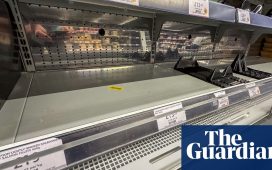Receive free Deforestation updates
We’ll send you a myFT Daily Digest email rounding up the latest Deforestation news every morning.
EU rules to curb deforestation could have a “catastrophic” impact on global trade if the bloc does not help small producers and developing nations to adapt, the head of the multilateral International Trade Centre has said.
Pamela Coke-Hamilton, executive director of the ITC, a joint agency of the UN and World Trade Organization, told the Financial Times that a ban on goods linked to deforestation from entering the EU favoured big companies that can trace where their produce had been grown and risked “cutting off” smaller suppliers.
“What the biggest producers may do is, not being able to do the traceability for these small farmers, simply cut them off,” she said.
Countries such as Brazil or Honduras, among the main suppliers of coffee to the bloc, or Indonesia and Malaysia, key palm oil and rubber exporters, are among those most affected by the regulation.
Coke-Hamilton warned that exporters from those countries could try to sidestep the regulation by sending goods to countries with less stringent import rules, which would disrupt trade flows.
Depending on how well the EU addressed its outreach to developing countries the impact of the law on global trade could be “catastrophic or it could be OK”, she added.
The legislation, which will come into force at the end of next year, is the first in the world to ban imports of products linked to deforestation, including cattle, cocoa, coffee, palm oil, soya, wood and rubber.
It is part of an ambitious environmental agenda set out by the European Commission’s president Ursula von der Leyen in 2019 that gives the bloc the target of reaching net zero greenhouse gas emissions by 2050.
Ministers from Indonesia and Malaysia, concerned for their palm oil industry, are among those that have urged the EU to ease the new rules.
If small producers could not meet the requirements for exporting goods covered by the law this risked “a vicious cycle”, Coke-Hamilton said. “Once you have loss of market share, you have loss of income, then you will have lots of increased poverty, then increased deforestation because at the root of deforestation is poverty.
“We [risk] falling into the trap of reinforcing something that we’re trying to change,” she added. The ITC provides technical support on trade matters to smaller countries.
The law will benchmark countries according to whether they have a low, “standard” or high risk of deforestation or degraded forests. More goods that come from high-risk areas will be checked by customs officers.
The EU’s 27 member states will be responsible for carrying out checks and refusing goods that come from areas where forests have been cut down or damaged since 2020.
The UN’s Food and Agriculture Organization estimated that 420mn hectares of forest — an area larger than the EU — had been lost worldwide between 1990 and 2020. Every year the world continues to lose an additional 10mn hectares of forested land, according to the commission.
The law states that “when sourcing products, reasonable efforts should be undertaken to ensure that a fair price is paid to producers, in particular smallholders, so as to enable a living income and effectively address poverty as a root cause of deforestation”.
The commission has held meetings with stakeholders from various countries, including one at the WTO in June.
Coke-Hamilton said that, given the acute climate crisis, she was supportive of the act’s intentions. But despite leniency being applied to small producers, information requirements and the obligation to use geolocation technology still presented too much of a burden.
“Many [smallholders] are trying to just keep up with post-Covid, the cost of living crisis, climate change. They’re just caught in this maelstrom of survival,” she added.
The commission said the regulation “applies to commodities, not countries, and is neither punitive nor protectionist, but creates a level playing field. It will be implemented in an even-handed manner that does not constitute arbitrary or unjustifiable discrimination for third-country producers, or a disguised restriction to trade.”
It added that the law should be “fully compatible” with WTO rules and was “expected to boost market opportunities for sustainable producers regardless of their size”.
Brussels must review the law and its effect, particularly on smallholders and indigenous communities, by June 2028.











